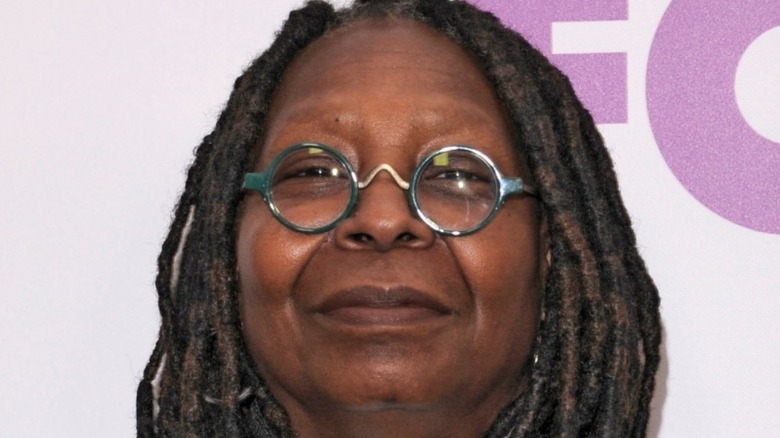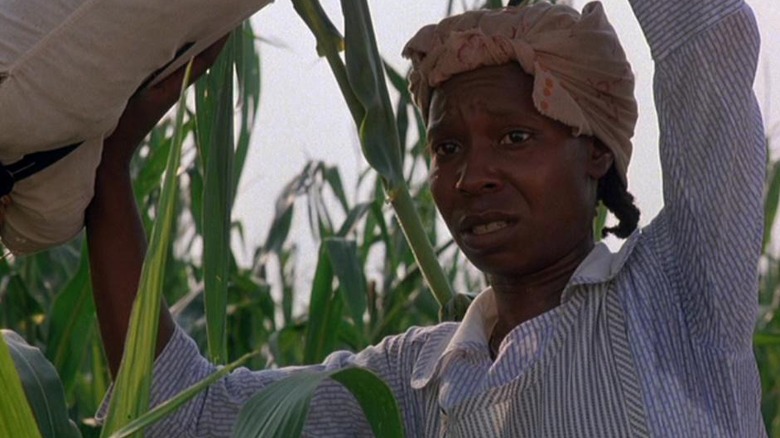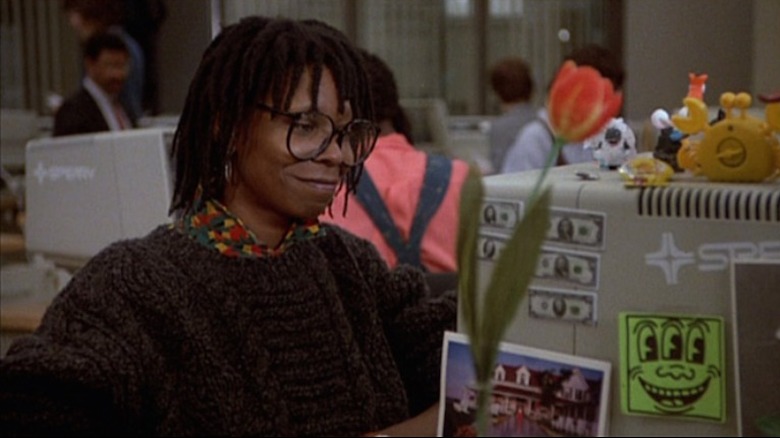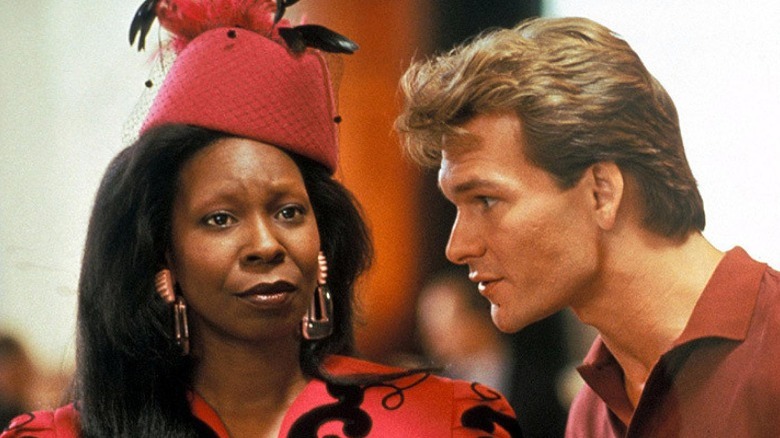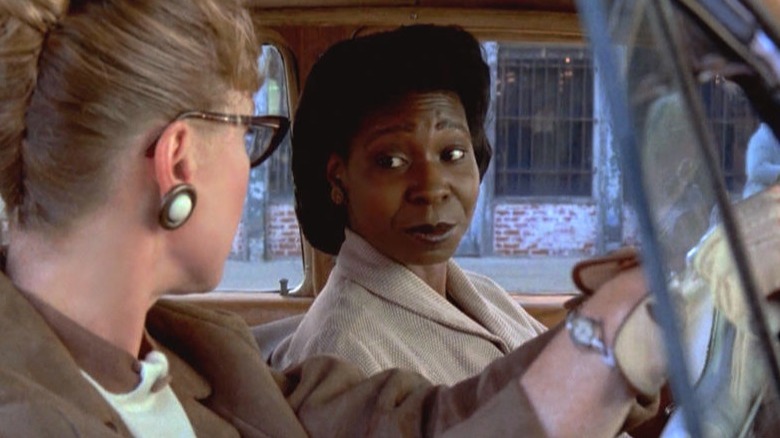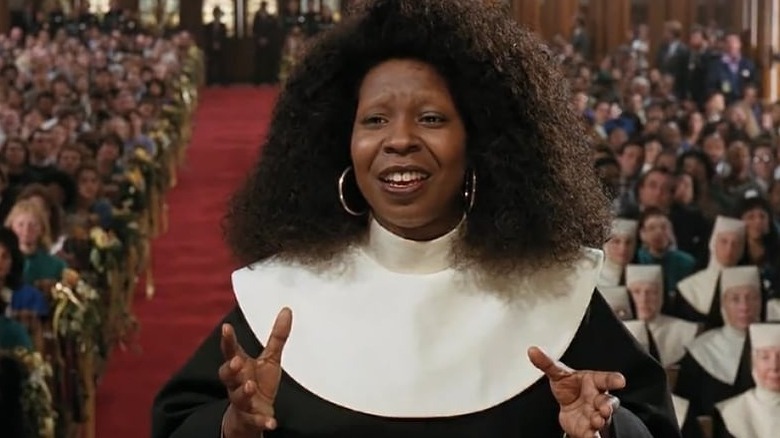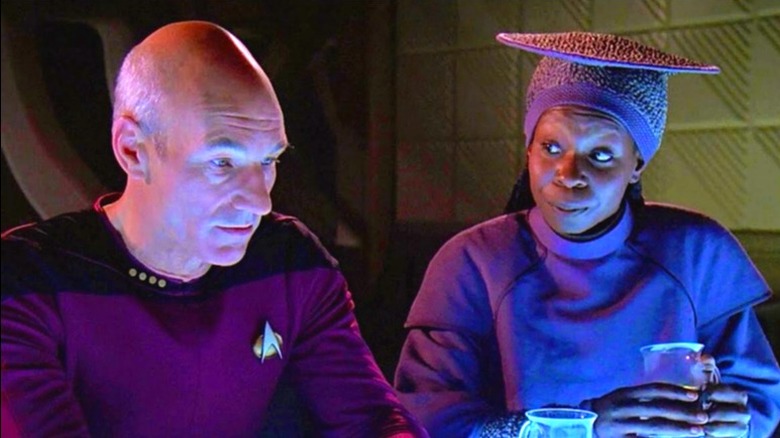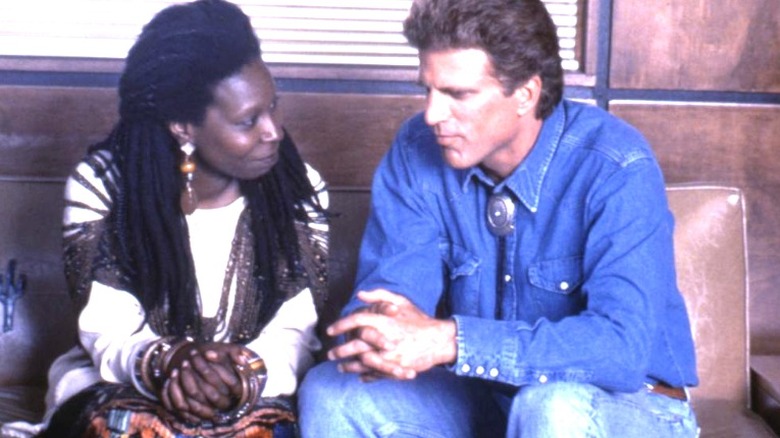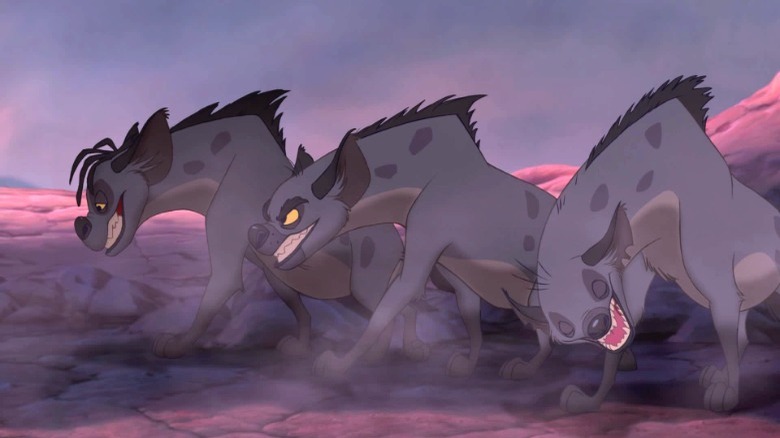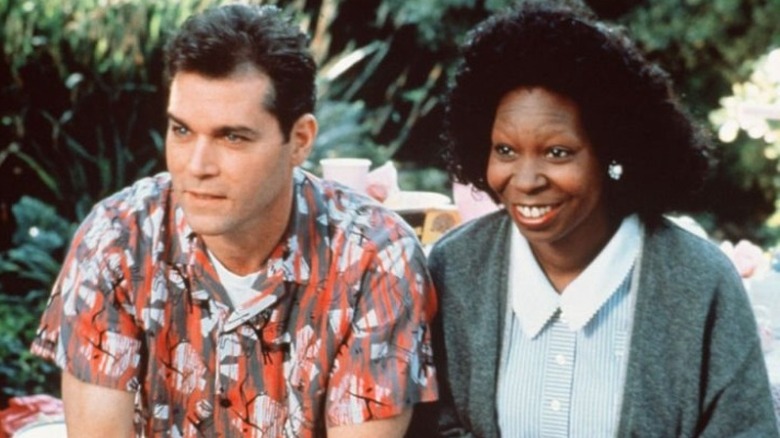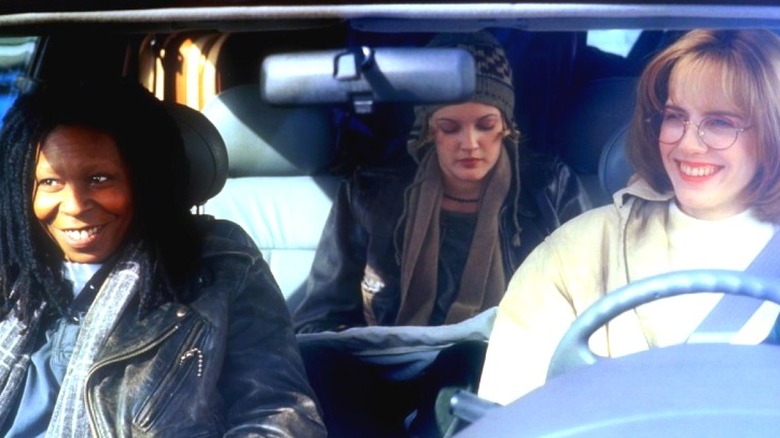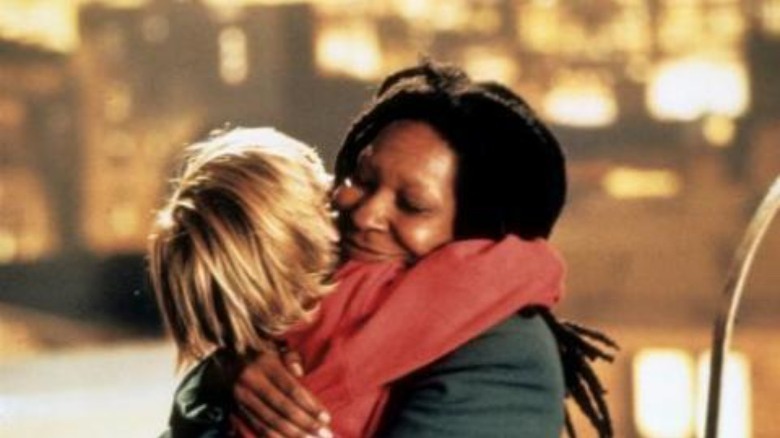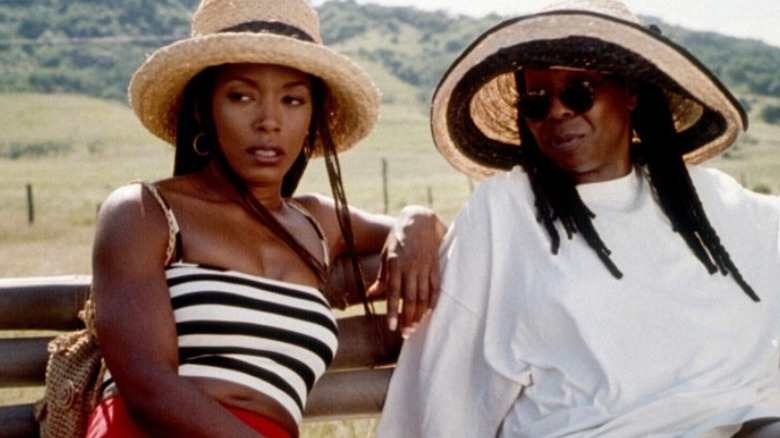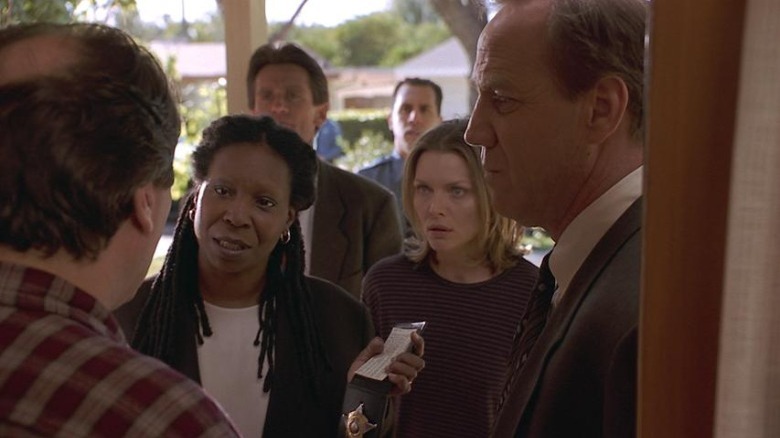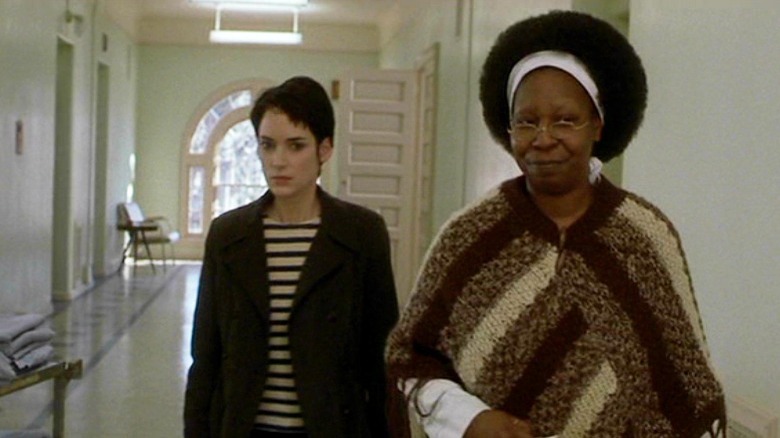Whoopi Goldberg's Best Onscreen Performances
While she is now a weekday staple as co-host and moderator of ABC's "The View," Whoopi Goldberg has been in the public eye for much longer than her tenure on the daytime talk show (nearly 40 years, in fact). And as one of only 16 people to join the distinguished EGOT club — a nickname for those who have won and Emmy, Grammy, Oscar, and Tony — she is nothing short of a Hollywood legend. Goldberg has established herself in nearly every facet of entertainment — onscreen and off — but she is best known for dazzling audiences in front of the camera.
With a voice as iconic as her stage name (she nicknamed herself "Whoopi" as an homage to whoopee cushions, as she says she's gassy), Goldberg's presence never goes unnoticed when she's onscreen. She has had both highs and lows in her illustrious career, but there has been no shortage of superb acting performances from the industrious, reliable Goldberg. Those who only know her as a singing nun-in-disguise or a ghost-seeing psychic might be shocked by the breadth of her filmography. Here is a list of Whoopi Goldberg's best onscreen performances in comedies, dramas, and just about everything in between.
The Color Purple
Whoopi Goldberg was so stellar in 1985's acclaimed "The Color Purple" that it is almost hard to believe that it was only her second screen role, after 1982's "Citizen." Prior to her distinguished career in film and television, Goldberg cut her teeth in the theater. Her one-woman show, "The Spook Show," impressed famed director Mike Nichols so much that he helped Goldberg bring it to Broadway. From there, she was noticed by many in the industry, including Stephen Spielberg, who cast her in "The Color Purple." Based on the Pulitzer Prize-winning novel by Alice Walker, the film focuses on Celie (Goldberg), an African American woman living in the rural South, who overcomes unimaginable abuses and intense bigotry.
The legendary critic Roger Ebert called Goldberg's role "one of the most amazing debut performances in movie history" and declared that she would win the Oscar. (She didn't.) In his column, he also wrote, "Goldberg has a fearsomely difficult job to do, enlisting our sympathy for a woman who is rarely allowed to speak, to dream, to interact with the lives around her." Goldberg's performance established her as a force to be reckoned with, earning her an Academy Award nomination, a Golden Globe Award, and a National Board of Review Award.
Jumpin' Jack Flash
After a notable guest appearance on the TV series "Moonlighting" — for which she earned her first Emmy Award nomination — Goldberg appeared as the titular character in "Jumpin' Jack Flash," the late Penny Marshall's directorial debut. Goldberg's Terry Doolittle, a computer operator at a New York City bank, becomes entangled in a deadly game of international espionage after communicating with a mysterious man ("Jumpin' Jack Flash") who claims to be a British Intelligence Agent.
While the film itself was not well-regarded, Goldberg's performance proved that her comedic abilities translated from the stage to the screen. In one hilarious scene, a disguised Terry gets her evening gown caught in a shredder. Roger Ebert gave the film two stars but started his review by stating that Goldberg was "the only original or interesting thing about" the movie. "Jumpin' Jack Flash" led to Goldberg starring in a number of similar comedy-adventure movies, including 1987's "Burglar" and "Fatal Beauty," both of which tanked at the box office.
Ghost
After years of flops — "Homer and Eddie" was an especially awful one — Goldberg reclaimed her early promise with her scene-stealing turn in "Ghost," which earned over $500 million at the box office. As psychic Oda Mae Brown, Goldberg turned out a performance that is nothing less than iconic. Oda Mae Is a frequent presence on lists of memorable movie characters, and "Molly, you in danger, girl" is arguably one of the best line readings in the history of film.
The bank scene is another showcase for Goldberg's stellar comedic chops and very well could be what won her the Oscar in 1990. And with that Best Supporting Actress Oscar win, Goldberg became only the second African-American woman to ever win the category — and the first in half a century. Though not every single critic was a fan – Gene Siskel said Goldberg was "off-putting with her far-too-broad acting style" — most critics loved the performance. Thirty years later, The Guardian's Peter Bradshaw called Goldberg's acting "superb" in his revisiting of the film. Take that, Siskel.
The Long Walk Home
Though Whoopi Goldberg won over America (and the rest of the world) with her "Ghost" performance, the massive attention on the film overshadowed "The Long Walk Home," released the same year. This is especially unfortunate, because it is one of Goldberg's strongest dramatic performances to date. The film is a civil rights drama set in the 1950s Deep South, focusing on the 1955 bus boycott in Montgomery, Alabama, which started days after Rosa Parks was arrested for her refusal to give up her seat to a white passenger.
Goldberg stars as Odessa Carter, who must walk four and a half miles to her job as a maid due to the boycott. When Odessa's employer Miriam (played by Sissy Spacek) starts giving her lifts to work, tension erupts both in Miriam's marriage and in the local white community. Roger Ebert praised the film as "powerful and affecting," with performances "so well played by Goldberg and Spacek that we understand not just the politics of the time but the emotions as well."
Sister Act
One-season television show "Baghdad Café" aside, Whoopi Goldberg's career stayed on the upswing in the years following her Oscar win. She really hit her stride in 1992, when the smash hit "Sister Act" sealed her place in pop culture history as the coolest movie nun of all time. In "Sister Act," Goldberg starred as Deloris Wilson, a lounge singer (stage name: Deloris Van Cartier) from Reno, Nevada, who must enter witness protection after witnessing her boyfriend Vince LaRocca (played by Harvey Keitel) commit a murder. Deloris goes into hiding as a nun named Sister Mary Clarence, takes over the struggling church chorus, and transforms the church, all while establishing strong bonds with her fellow nuns.
Goldberg was nominated for a Golden Globe for her performance, and the film's box office success led to a less profitable but no less fun sequel ("Sister Act 2: Back in the Habit"). In The Hollywood Reporter, critic Jeff Menell praised Goldberg and said the part "seems to have been written expressly for her." Fun fact: It was actually designed for Bette Midler, who dropped out of the film.
Star Trek: The Next Generation
Technically, Whoopi Goldberg started on "Star Trek: The Next Generation" before "Sister Act," but her character recurred for five years up until 1993. Goldberg appeared as Guinan, an alien lounge bartender aboard the USS Enterprise-D. As a Trekkie herself, Goldberg approached "Star Trek" creator Gene Roddenberry and asked for a role. She reportedly gave an impassioned explanation for her interest, which had to do with the presence of Nyota Uhura (played by Nichelle Nichols) in the original series. She told Roddenberry, "When I was a little girl, it was like, 'Oh, we are in the future.' Uhura did that for me. So, I want to be on your show."
Altogether, Goldberg appeared in 28 episodes of "Star Trek: The Next Generation," as well as two feature films (1994's "Generations" and 2002's "Nemesis"). On a January 2020 episode of "The View," Sir Patrick Stewart (aka Captain Jean-Luc Picard) invited Goldberg to reprise her role on a future season of "Star Trek: Picard." She gladly accepted the offer, so look for her to appear somewhere down the line.
Made in America
In the comedy "Made in America," Whoopi Goldberg starred as single mother Sarah Matthews, performing alongside her then-boyfriend Ted Danson of "Cheers" fame. In the movie, Sarah's daughter Zora (Nia Long) wants to know who her father is, so she and her friend Tea Cake Walters (Will Smith) set out to track down her mother's sperm donor. Ted Danson co-stars as the sperm donor, and he turns out to be an annoyingly loud and brash car salesman who is most definitely not the Black donor whom Sarah had requested.
The movie did relatively well at the box office, and while reviews for the film were overall generally negative, Goldberg's performance was praised. In his column, Roger Ebert concluded that the film was basic and predictable but that he still found it nice — and that was specifically because of Goldberg's performance style, which he praised for its directness.
The Lion King
In the award-winning and internationally beloved "The Lion King," Whoopi Goldberg proved that she does not need to be seen to deliciously devour a role. It turns out, all that's needed is her legendary voice, which she leant to Shenzi in the 1994 Disney film. Shenzi is one of Scar's pack of scary hyena assistants — the one who famously asks Simba if he knows what they do to kings who step out of their kingdoms — and it is one of Goldberg's earliest voice acting roles. She has since done a variety of voiceover work, not only in animation but also as a narrator.
The part of Shenzi was originally supposed to be played by Tommy Chong, as another hyena was played by his frequent scene-partner Cheech Marin. When Chong was unavailable, the character's gender was changed so that Goldberg could take on the role. In 2019, USA Today's movie reporter published a 25-year commemorative article that praised the villainous hyena's portrayers, writing that "Whoopi Goldberg and Cheech Marin showed teeth as hilarious hyenas."
Corrina, Corrina
The same year as "The Lion King," Whoopi Goldberg also appeared in "Corrina, Corrina," which she headlined alongside Ray Liotta. The movie, which is set in 1959, features Goldberg as Corrina Washington, a maid and nanny who goes to work for recent widower Manny Singer (Liotta) and his young daughter Molly (Tina Majorino), who refuses to talk after the death of her mother. The film not only explores themes of loss and grief, but it also tackles interracial relationships. Corrina and Manny eventually fall in love, facing many hurdles as a mixed-race couple in the late 1950s.
The film was by no means a critical darling, but many took note of Goldberg's performance. For example, The Hartford Courant movie critic Owen McNally called Goldberg "brilliant" and "terrific" in the film. Rotten Tomatoes top critic Nell Minow, otherwise known as "Movie Mom," had similar praise, declaring that "Whoopi's performance makes [the film] watchable." Despite Goldberg's best efforts, "Corrina, Corrina" was not a commercial success.
Boys on the Side
Whoopi Goldberg was incredibly productive in the 1990s, racking up over 60 acting credits, according to IMDb. (She has 193 credits and counting at current.) In a very busy decade of performances, Goldberg's appearance in 1995's female bonding flick "Boys on the Side" was a strong standout. In "Boys on the Side," Goldberg stars as Jane DeLuca, a musician recovering from a rough breakup with her girlfriend who takes off on a cross-country move with a travel companion, Robin (Mary-Louise Parker), whom she finds through a newspaper advertisement. On the way, they visit Jane's friend Holly (Drew Barrymore), who ends up joining the road trip after killing her abusive boyfriend in defense of Jane. The film explores the complex nature of the women's friendships as they evolve over time, complicated by Robin's poor health (she has HIV), Holly's pregnancy, and the repercussions of that whole murder thing.
"Boys on the Side" received mixed to positive reviews, and Goldberg was once again singled out by legendary critic Roger Ebert. In his column, Ebert said that Goldberg's "work here is a reminder of such great past roles as 'The Color Purple' and 'The Long Walk Home'" and called her acting "an exercise in restraint," "very funny," and "wise, grown up and calm."
Bogus
Whoopi Goldberg tends to star in a lot of movies that don't quite live up to her talent, and "Bogus" is not an exception to this trend. Nonetheless, Goldberg herself is in fine form here in one of her better performances of the late 1990s. Goldberg plays Harriet Franklin, who is tasked with raising an orphaned boy named Albert (played by a seven-year-old Haley Joel Osment). The biggest issue is that Albert, the son of Harriet's late foster sister Lorraine, is part of a package deal. His other half, a flamboyant magician named Bogus (Gerard Depardieu), is imaginary, and only Albert (and later Harriet) can see him.
Though reviews were mixed overall, Roger Ebert praised Goldberg for her "charm" (and Depardieu, too) in his Chicago Sun-Times review. New York Times critic Janet Maslin said Goldberg "helps the film with a confident performance." Unfortunately, the masses weren't on board, and the film missed at the box office, opening outside of the top 10 and bringing in under $5 million in grosses.
How Stella Got Her Groove Back
While she has proved she can headline a film (see: "Sister Act"), a little Whoopi goes a long way, and some of Goldberg's best work has been in supporting roles — like her turn in 1998's "How Stella Got Her Groove Back." Based off of the Terry McMillan book of the same name, the film features Goldberg as Delilah Abraham, the best friend of main character Stella Payne, played by Angela Bassett. The two take a vacation to Jamaica, where Stella meets a hot young boytoy (Taye Diggs, in his film debut), and Delilah offers all the sass one could ever need.
The bulk of the film hinges on the romance between lonely, overworked Stella and her much younger paramour, but Goldberg impresses every moment that she is on the screen. In a review for The Hollywood Reporter, critic Duane Byrge celebrated Goldberg's "saucy turn as Stella's rambunctious sidekick," calling her "at once hilarious and heart-rending." Goldberg won a NAACP Image Award for the role in the film, which has gained somewhat of a cult following over the years.
The Deep End of the Ocean
Though the movie itself is only average, Whoopi Goldberg's supporting turn in the Michelle Pfeiffer-fronted "The Deep End of the Ocean" was her next great performance. The film is about a boy named Ben (played in his older years by Ryan Merriman) who is kidnapped as a three-year old and then mysteriously found nine years later when he shows up on his family's doorstep under a new name. The bulk of the melodrama surrounds Ben, his parents Beth (Pfeiffer) and Pat Cappadora (Treat Williams), and his brother Vincent (Jonathan Jackson), but Goldberg — as Candace "Candy" Bliss, a detective and eventual family friend — once again proved that she can make a mark even with limited screen time.
Writing for Rolling Stone magazine, famed critic Peter Travers said that Goldberg "excels" in the role, and The New York Times' Janet Maslin wrote that Candy was "played sturdily by Goldberg."
Girl, Interrupted
If there's one downside to Whoopi Goldberg's 1999 performance as Valerie Owens in "Girl, Interrupted," it's simply that there's not enough of it. It's a minor role — not quite a cameo but not exactly supporting, either — but a memorable one. As the strict but caring head nurse at psychiatric hospital Claymoore, Valerie serves as a contrast to the struggling, unpredictable patients (played by Wynona Ryder, Angelina Jolie, Elisabeth Moss, and others).
In his New York Times review of the film, Stephen Holden wrote that Goldberg was "at her calm, understated best" in the movie. While "Girl, Interrupted" is most often remembered for being the vehicle behind Angelina Jolie's Academy Award, Goldberg's heart, soul, and sass shine through in her performance. In fact, one of the movie's best lines comes from Goldberg, when Valerie tells main character Susanna (Ryder) that she "a lazy, self-indulgent little girl, who is driving herself crazy." Unlike Susanna, with nearly 200 onscreen credits to her name (not to mention her production and stage work), Whoopi Goldberg is anything but lazy.
